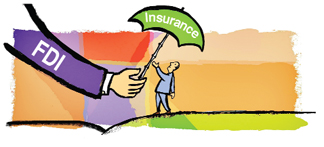Intro: In Insurance, currently Korea, Taiwan and Mexico allow 100 per cent FDI; cautious Malaysia allows 70 per cent, the Philippines 51 per cent and China allows 50 per cent FDI. In comparison for the past 14 years, the FDI limit of insurance is only at 26 per cent in India. ?

When the country was trying to fight the aftermaths of the Uttrakhand tragedy, the insurance companies were first to run “Helpline for the people and their families who suffered in the catastrophe”. Their claims were taken up by the insurance companies at priority and people who took life cover or other insurance benefitted. Insurance in India is still considered to be as tax saving or an investment tool by majority of people but it’s quite important to realise that protection is the most important component of insurance. In fact people living in our country should be covered against the odds as proposed by the prime minister of the country in his speech on Independence Day. Till now, insurance penetration in India is very low and the picture gets worst day by day due to shortage of capital and strict regulatory environment. According to the latest reports of Insurance Regulatory and Development Authority (IRDA) Insurance Penetration of our country has fallen down to a new low of 3.96 per cent from 4.1 per cent of the GDP as compared to the world average of about 6.9 per cent. Poor penetration of insurance is accompanied by low density – measured in US dollars. This is best illustrated by the absolute numbers in insurance spent across sectors in India. Currently, the density of insurance in India is US $ 53.2 that is less than one-tenth of the world average of $ 627.3. India does poorly even in comparison to its peers in the BRICS nations – density in Brazil is over five times at $ 327.6, over four times in Russia at $ 296.8 and three times that of India in China which has a density of $ 158.4. As quoted in the 12th Plan (2012-17) document, “Insurance premia accounts for less than 1 per cent of GDP, which is only about a third of the international average”. In such a weak protection scenario, any emergency or health crisis can shake the foundation of a family and can deplete the ability of the workforce.
Common Qualms?
|
With increase in the foreign direct investment as proposed in the insurance amendment bill, capital infusion will take place and can change the above picture. Increase in the insurance penetration will also complement government’s primary agenda of financial inclusion. Insurance business is in gestation period and requires a large amount of capital. Increase in the FDI in insurance sector will not only cater this need of existing insurance companies but will also help the country in their need for capital across various industries. Also, Insurance companies largely invest into Government securities, based on regulatory requirement and as investment strategy. They are one of the largest subscribers to long term debt papers issued by GOI. All this provides the government with Capital to build social and core infrastructure.
Higher FDI in insurance sector will create more jobs and in turn will help the economy to grow. Since 1999, when India first opened the sector, the insurance industry has helped job creation throughout the country. Since that time, insurance liberalisation has led to the creation of over three million quality jobs, either in the company or as an insurance agent. The insurance business gives a big push to the real economy on the ground. Over 2.5 Lakh people are directly employed by Life Insurers and further 30 lakh people earn livelihood through insurance as Agents.
Increase in FDI will also help the tertiary sector to grow speedily. With new entrants coming new offices will be set up which will give a huge boost to the real estate, construction and allied industries.With inflow of capital the existing insurance players will also try to consolidate which is believed to help in job creation and development of small scale business. Most private insurers have made massive investments in IT solutions and hardware, primarily with Indian IT companies. A host of other vendor services like medical support and travel services will also receive a boost. Employment and business activity will in turn profit small businesses such as eateries and local transport.
The virtuous cycle of triggering economic activity cannot be under estimated as it cascades down to the grass roots of the economy. It creates many jobs that don’t show up strongly on the radar but help members of poor families earn a livelihood. Insurance industry will also touch tier III and IV cities which will help the rural and semi urban population not only in terms of income but will provide them protection.
Since the passage of the IRDA Bill in 1999, the insurance industry has improved and this has also helped the public players. The government-owned companies have seen their business grow over the last decade. The biggest beneficiary has been the customer who now has a choice of several products. With companies competing with each other, the value proposition for the customer has improved as under the heat of competition companies have dropped prices. Service standards have witnessed a radical change and under the pressure of competition they are constantly getting better.
The insurance bill which is pending in the parliament for long should now be passed without any further delay. The12th plan (2012-17) quotes “The government has been considering steps to increase the scale of FDI permitted in the insurance sector but a lack of political consensus has held back change”.The delay in the increase of FDI cap will cause the big insurance players to walk out of India – leading to significant capital erosion and a huge dent to formation of a strong insurance sector in this country. New companies will stay away and perhaps invest in China and other Asian markets where regulations are more favourable, and willmove FDI into those markets. Some existing foreign players have already left the Indian market due to scarcity of capital.
With the change of power at the centre and taking a note of the finance minister’s budget speech we can definitely hope that this limit will be revisited soon.
Dr Abhishek Tandon ?(The writer is an Assistant Professor, Shaheed Sukhdev College of Business Studies, University of Delhi)
?














Comments